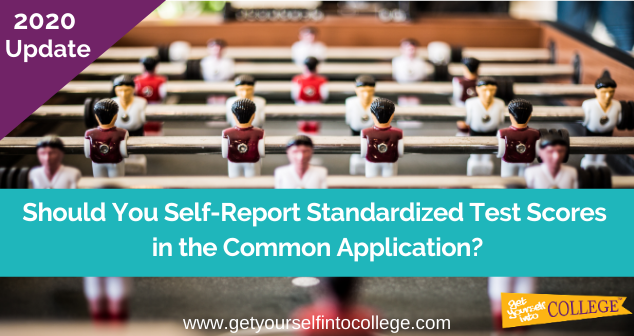This article was published before COVID and has not yet been updated. Students are always asking me whether or not they should self-report their standardized test scores in their college applications.
2020 UPDATE ON SELF-REPORTING STANDARDIZED TESTS
Since first publishing this article in 2017, there have been some VERY significant changes in terms of colleges allowing you to self-report your standardized test scores, so what follows is an update for 2020.
In the past, you almost always had to send all your schools an official SAT or ACT score report along with your application. You did not–and do not–need to send your official AP scores.
Now, many colleges allow you to self-report all of your standardized test scores and only submit an official score report if you get accepted to a particular school and decide to attend.
This change can save you some money.
Each official SAT score report costs $12. Don’t forget that “you can send four free score reports to colleges every time you register for the SAT.”
Each official ACT score report costs $13 per test date, so if you took the ACT two times and your college still requires an official score report and wants all scores, you’re going to have to pay $26.
There are fee waivers for both the SAT and ACT, but many students don’t qualify for them, so this change can benefit a even wider range of students.
You can learn more about the motivations behind this shift by checking out “More Colleges Let Applicants Self-Report Test Scores,” which was published in Inside Higher Ed.
CHECKING THE FACTS & STAYING ORGANIZED
I’m giving you a quick overview of the policies at Ivy League schools as well as those at some other schools.
Links to the policies at each of these colleges are also included so that you can quickly verify things. It’s important to do your own fact-checking with each school on your list, especially since I expect more changes to be coming in the near future.
I give all my students a Google Sheet that makes it super easy to track the requirements at each of their schools and how they have submitted their scores. I suggest you create your own to stay super organized.
CAN YOU SELF-REPORT STANDARDIZED TESTS SCORES FOR IVY LEAGUE SCHOOLS?
You CAN self-report your test scores within the Common Application or your Brown Applicant Portal if you go to high school in the United States.
If you attend high school outside the US, you need to self-report and “have your official test scores sent directly to Brown.”
Brown accepts Score Choice. They will “super score within the current SAT,” and for the ACT, they “consider the highest scores submitted for each section; however, we do not calculate a super scored ACT Composite score.”
You CAN self-report your scores for Columbia.
Columbia points out that “if you take an exam more than once, you will be evaluated on the highest score you received in any individual section.”
You CAN’T just self-report your standardized test scores. Cornell states that “all required scores must be officially reported. . .from the testing agency.”
Cornell “participates in the College Board Score Choice program. For the SAT, Cornell considers the highest section scores across test dates. For the ACT, Cornell considers the highest composite score across all ACT test dates.”
Details to come.
You CAN self-report your “SAT and ACT test scores (including Subject Tests, Advanced Placement, IB, etc.)” for Harvard.
Harvard tells you that “you are free to use the College Board Score Choice option or the similar option offered by the ACT.”
You CAN’T just self-report your scores to Princeton. Princeton states that “you must submit your SAT and/or ACT scores to Princeton directly from the testing firms.”
Princeton allows “applicants to use the score choice feature of the SAT and accept[s] only the highest composite score of the ACT, but. . . encourage[s] the submission of all test scores.”
You CAN self-report your SAT and ACT test scores if you go to high school in the US. You can choose which scores to share. Penn says, “we recommend that you self-report each test you will use to select the highest score in each section.”
However, your “SAT Subject Tests, TOEFL, and IELTS scores must be sent through official testing agencies to be considered with your application.”
You CAN self-report your standardized test scores “on the application and/or via the `Update Application’ form, available on the Yale Admissions Status Portal after [your] application has been received.”
Yale says “applicants who have taken the SAT or ACT exam multiple times should report all scores from whichever test they choose to report. Applicants who choose to report scores from both the SAT and ACT should report all scores received on both tests. If space in the testing section of the application is insufficient to self-report all SAT or ACT scores, applicants should use the `Update Application’ form available via the Yale Admissions Status Portal to self-report additional scores after submitting an application.”
SELF-REPORTING STANDARDIZED TEST SCORES AT OTHER SCHOOLS
This list is far from complete. To give you a sense of the variations, I’m sharing the policies at some of the schools that are popular with my students.
Boston University: You CAN’T just self-report. Your “official score reports must be sent to BU directly from the College Board or ACT.”
BU “superscores both the SAT and ACT” and allows you to use Score Choice.
Caltech: You CAN self-report. As Caltech notes, “we will accept self-reported test score information directly from students submitted either through the application or through your Caltech Student Portal.”
Caltech recommends “that you report all of your available standardized test scores because the Admissions Committee will be certain to review the strongest score in each category, across all of the exam(s) you’ve taken. Caltech will superscore across SAT exam dates.” However, “Caltech will not calculate a new composite ACT score,” but “if you took the ACT multiple times, the Admissions Committee will take note of the differences in your score performances across sections.”
You CAN can self-report.
Duke says they’ll “consider the highest scores on each section of the SAT, regardless of test date.” If you “submit both ACT and SAT scores, Duke will consider your best score.” They “strongly recommend that students who submit only the SAT also submit two subject test scores of their choice (with math recommended for Pratt).”
You CAN self-report.
Emory “considers your highest section scores across all SAT dates submitted (also known as superscoring).” They don’t “superscore the ACT exam, as the exam is not made to be used this way. For students who submit multiple ACT exam scores, we review the overall score and sections scores from your highest composite ACT exam.”
You CAN’T self-report. MIT requires your scores to be reported to them “officially from the testing agency; scores you list on your application and scores appearing on your school transcript will not be considered official.
You “are free to use the College Board’s Score Choice option and the ACT’s option to submit the scores of your choice as well.”
You CAN’T self-report for NYU. As they note, “we will not offer admission to a student unless we have official testing on file and NYU does not consider results submitted by the applicant as official.” However, if you cannot have the College Board send your scores, they allow a “school official [to] submit them.”
You can use Score Choice for NYU.
You CAN self-report to Northeastern.
However, you can’t just self-report in the Common Application. You need to self-report within Northeastern’s system, which is accessible through the Application Status Check.
You CAN self-report to Northwestern.
Northwestern “applicants are not obligated to report scores from all test dates.”
You CAN “simply self-report your highest scores in the testing section of the application.”
HOW TO SELF-REPORT STANDARDIZED TEST SCORES IN THE COMMON APP
Let’s make sure you’re super clear on all the basic options for self-reporting scores.
In the Common App, there’s a section called Testing. You’re asked:
“In addition to sending official score reports as required by colleges, do you wish to self-report scores or future test dates for any of the following standardized tests: ACT, SAT/SAT Subject, AP, IB, TOEFL, PTE Academic, and IELTS?“
For the ACT, you’re asked to share how many ACT scores you want to report and how many future ACT tests you plan to take. You’re also asked if you’ve “taken the ACT Plus Writing test” and to share your “highest composite score,” “highest English score,” “highest math score,” “highest reading score,” “highest science score,” “highest combined English/Writing or Writing Subject Score” as well as the dates for them (month, day, and year).
For the SAT, there’s an option to share scores from the older version of the test as well as the new one (March 2016 or after). You’re asked to indicate how many “past SAT scores you wish to report” and the “number of future SAT sittings you expect.” You’re asked if you’ve “taken the SAT essay” and to share your “highest evidence-based reading and writing score,” “highest math score,” and “highest combined essay score” as well as the dates for them (month, day, and year).
For SAT Subject Tests, you’re asked to indicate the “number of SAT Subject Tests you wish to report, including tests you expect to take,” the “date taken or planned” (month and year), the subject, and your score.
AP refers to scores on Advanced Placement Tests. You’re asked to share the same basic info as for the SAT Subject Tests.
IB refers to scores on your International Baccalaureate Subject Tests. You’re asked to share the “number of IB Tests you wish to report, including tests you expect to take,” “date taken or planned,” subject, level, and your score.
TOEFL (Test of English as a Foreign Language) refers to a test for international students. You’ll be asked to indicate how many “times you have already taken the TOEFL iBT” and the “number of future TOEFL iBT sittings you expect.” You’re also asked to share your “highest reading score,” “highest speaking score,” “highest listening score,” “highest writing score,” and “highest TOEFL iBT total score.” For all of these, you’re asked to share the month, day, and year of the test.
The PTE Academic Test (Pearson Test of English) and IELTS (International English Language Testing System) are other English tests for international students and have self-reporting requirements similar those for the TOEFL.
SHOULD YOU SELF-REPORT YOUR AP TESTS?
You don’t submit official AP score reports in the admissions process, so if you’ve earned impressive scores (4 or higher) on them, you should consider self-reporting them. I mean, why not share some positive scores with the admissions team?
In general, you only need the official AP score reports when you’ve been accepted and want to receive credit for them.
Stanford states that students “are not required to submit AP scores as part of [the] admissions process. However, we welcome the self-reporting of these scores as additional information to your application.”
Prior to this 2019 update on Stanford’s admissions page, students were told that “AP scores that are reported are acknowledged but rarely play a significant role in the evaluation of an application. Grades earned over the course of a term, or a year, and evaluations from instructors who can comment on classroom engagement provide us with the most detailed insight into a student’s readiness for the academic rigors of Stanford.” This information is no longer available on the Stanford admissions page, but it still might be true.
Princeton recommends that you “self-report all of your AP or IB scores on your application.”
YOUR NEXT STEPS
As I mentioned earlier, you should create a way of tracking the requirements at each of your schools. There’s a great deal of variation in terms of these new self-reporting options, so you need to stay on top of things.
WAYS TO WORK WITH DR. BERNSTEIN!
Click here to learn how to schedule a private consultation with Dr. Bernstein.
Click here to learn more about Dr. Bernstein’s ongoing private college preparation and college admissions support.
Click here to learn about the online Get Yourself Into College® program.
Blog post image used: ©Pascal Swier/unsplash.com



